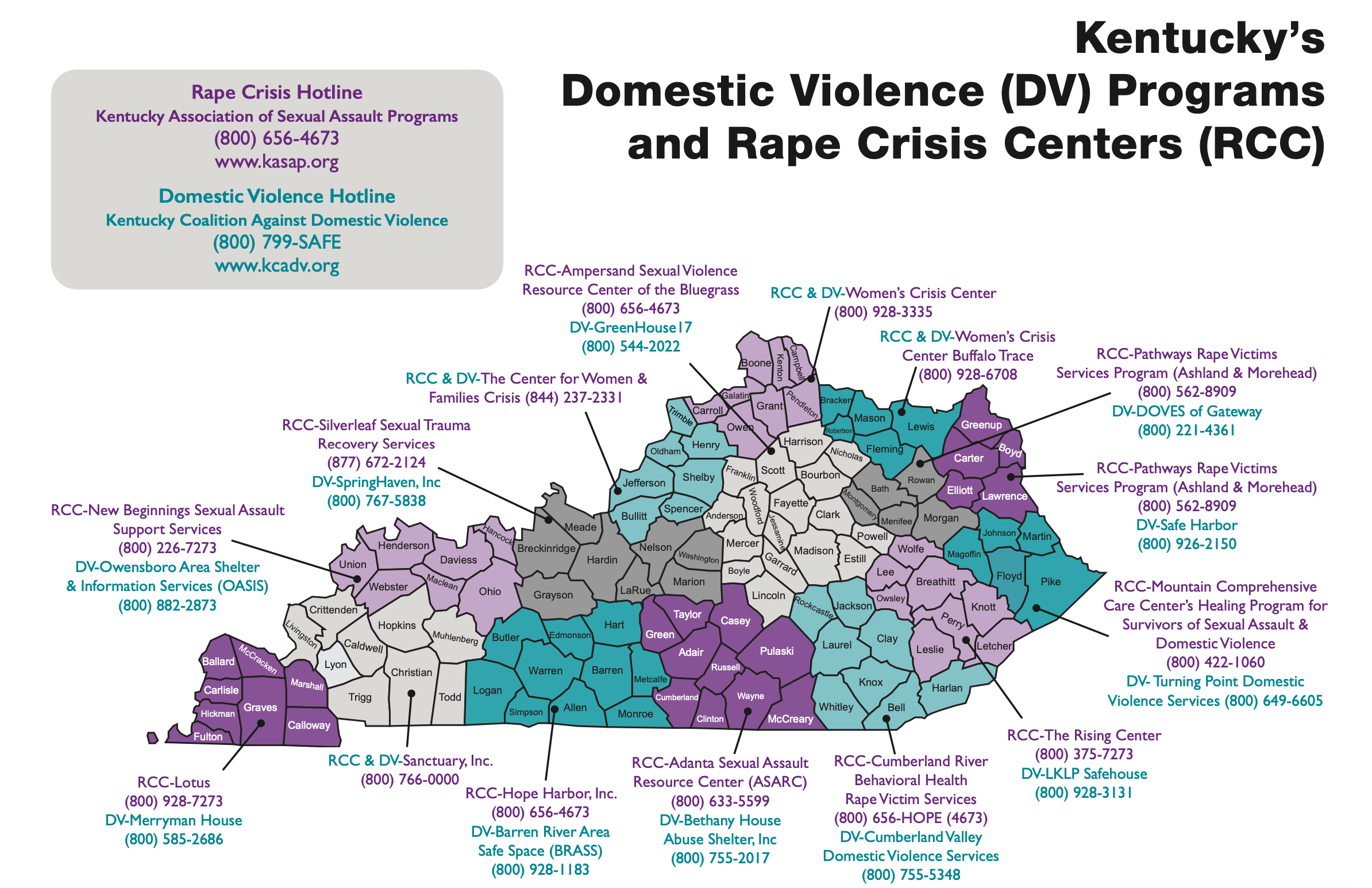Services
Emergency protective orders
Filing a Protective Order
Protective orders are available in all service areas of Sanctuary, Inc., including Christian, Caldwell, Crittenden, Hopkins, Lyon, Livingston, Muhlenberg, Todd and Trigg counties. You DO NOT have to pay to file a request for a protective order.
Protective Orders in Kentucky
There are different categories of restraining orders from various court proceedings, including but not limited to criminal court and other family court cases. We are providing information specifically on the Kentucky Domestic Violence Order as it provides stricter enforcement laws and consequences if violated compared to other types of restraining orders.
In Kentucky, protective orders are commonly known as EPOs (emergency protective orders), DVOs (domestic violence orders) and IPOs (interpersonal protective orders). The person who requests protection is known as the petitioner and the person for whom it is against is known as the respondent.
About Emergency Protective Orders (EPO)
To file a request for an EPO, you must show there has been an act of domestic violence. The state of Kentucky only grants EPOs when there are signs of physical injury, serious physical injury, sexual assault, sexual abuse or the threat of physical injury, serious physical injury, sexual assault or sexual abuse.
After you request protection, the reviewing judge may grant or deny the EPO or may grant a summons for a future court date for the judge to hear further evidence before making a decision to grant or deny the EPO.
If the judge grants the EPO, it means that the court is granting protection in advance of a full court hearing. An EPO will become binding and effective after the respondent is served with notice of the order.“Served” means that the sheriff’s office provides the respondent with a copy of the order.
From the time that the judge grants an EPO until the hearing takes place, the judge can order the following requirements for protection:
- No contact
- No further violence
- No disposing or damaging of property
- Stay a specific distance from residence, school, work, minor child, family member
- Vacate residence
- Temporary custody
- Maintain distance of up to 500 feet
- Enter any other orders as needed, not including GPS tracking
An EPO is temporary. A full hearing is scheduled within 14 days of requesting an EPO. The full hearing can only take place after a respondent is served.If respondent is not served by the court date, the court has the power to keep an EPO in place for up to six months while regularly reviewing the case, usually at two-week increments.
After the respondent is served, a hearing will go forward where the judge takes evidence from the petitioner, respondent and any witnesses.Evidence may include testimony, photos, communications between the parties, police reports, etc.The evidence will help the judge determine if there were acts of domestic violence as defined by Kentucky law. If there is sufficient evidence, as defined by law, the judge will issue a DVO.
About Domestic Violence Orders (DVO)
To obtain a Kentucky Domestic Violence Order, your relationship with the respondent must meet the definition of family member, married or ex-spouse, who lived together as a couple or have a child in common.
There are 2 kinds of Kentucky DVOs that can be requested:
- No Contact Order: This means there can be no contact of any kind between you and the respondent
- No Unlawful Contact Order: This allows you to still have contact with the respondent but stops the respondent from committing any further threats or acts of violence. Judges can order the same requirements in a DVO that they can order on an EPO (see above).
Additionally, they may also order the following requirements:
- Award temporary maintenance
- Order counseling or treatment for one or both parties
Kentucky DVOs are limited to three years but may be extended upon motion to the court before expiration of the DVO.If the judge grants you a DVO, you need to keep it with you at all times. It is also a good idea to review safety information.
Interpersonal Protective Order (IPO)
As of January 2016, Kentucky offers its residents a new form of protective order: the IPO, which provides protection to victims of violence and abuse in a dating relationship, victims of sexual assault and victims of stalking.
A petition for an IPO may be filed by:
- A victim of dating violence and abuse
- A victim of stalking
- A victim of sexual assault
- An adult on behalf of a victim who is a minor otherwise qualifying for relief under this subsection
The petition may be filed in the victim’s county of residence or a county where the victim has fled to escape dating violence and abuse, stalking or sexual assault.
In most Kentucky counties, the IPOs will be heard in District Court rather than Family Court.
Information You May Need to File a Protective Order
Report the requested information to the best of your ability. Providing more information to law enforcement will assist them in serving the defendant.
Information about the abuser that will be helpful in filling out the request:
- Full name (first, middle, and last)
- Birth date, Social Security number, driver’s license number
- Height and weight
- Current residence address (directions for rural areas)
- Usual residence address (directions for rural areas)
- Occupation
- Employer’s name
- Employer’s address
- Was a weapon involved?
- Is the abuser believed to be armed and dangerous?
- Is there a pending divorce action? If so, the county and case number
- Is there a pending custody action? If so, the county and case number
Information about you that will be helpful in filling out the request:
- Full name (first, middle, and last)
- Birth date
- Current residence address (directions for rural areas)
- Usual residence address (directions for rural areas)
- Occupation
- Employer’s name
- Employer’s address
- Information needed for each minor child:
- Full name (first, middle, and last)
- Birth date
- Current residence address (directions for rural areas)
- Usual residence address (directions for rural areas)
After gathering as much information as possible, you will need to go to the intake location for your county.

INTAKE LOCATIONS
Where to File
Protective Orders
Listed below are locations for filing protective orders in the service areas for Sanctuary, Inc. For counties outside of our service area, please contact your local courthouse.

Christian County
Monday – Friday 8 a.m. – 4 p.m.
Christian County Justice Center
100 Justice Way, 2nd floor
Hopkinsville, KY 42240
270-889-6539
After hours and weekends
Hopkinsville Police Department, Christian County Jailer, Christian County Sheriff’s Office, Christian County Attorney’s Office and Kentucky State Police.

Caldwell County
Monday – Friday 8 a.m. – 4 p.m.
Caldwell County Courthouse Annex
105 W. Court Square
Princeton, KY 42445
270-365-6884

Crittenden County
Monday – Friday 8 a.m. – 4:30 p.m.
Crittenden County Courthouse
107 S. Main St., Suite 202
Marion, KY 42064
270-965-4200

Hopkins County
Monday – Friday 8 a.m. – 4 p.m.
Hopkins County Justice Center
120 E. Center St.
Madisonville, KY 42431
270-824-7502

Lyon County
Monday – Friday 8 a.m. – 4 p.m.
Lyon County Judicial Center
400 West Dale Ave.
Eddyville, KY 42038
270-388-7231

Livingston County
Monday – Friday 8 a.m. – 4 p.m.
Livingston County Justice Center
122 W. Adair St.
Smithland, KY 42081
270-928-2172

Muhlenberg County
Monday – Friday 8 a.m. – 4 p.m.
Muhlenberg County Judicial Building
136 S. Main St.
Greenville, KY 42345
270-388-4850

Todd County
Monday – Friday 8 a.m. – 4 p.m.
Todd County Court of Justice
204 W. Main St.
Elkton, KY
270-265-5631

Trigg County
Monday – Friday 8 a.m. – 4 p.m.
Trigg County Justice Center
41 Main St.
Cadiz, KY 42211
270-522-6270
After Your Petition is Filed
After you file your request for protection, the judge may or may not issue an EPO. Regardless, you will receive a date and time to appear in court.
If you receive an EPO, you need to keep a copy of it with you at all times.
Sanctuary, Inc. can provide legal advocacy for you at your hearing. Call to request an advocate. 1-800-766-0000
Additional Safety Planning with a Protective Order
Your DVO will be entered into a nationwide database for law enforcement access.
Violations of an active protective order should be reported to your local law enforcement agency as soon as possible after the offending behavior.
What should I do when I leave the courthouse?
Here are some ideas that might be helpful to you after leaving the courthouse:
- Make several copies of the order as soon as possible.
- Keep a copy of the order with you at all times.
- Leave copies of the order at your workplace, at your home, at the children’s school or daycare, in your car, with a sympathetic neighbor, and so on.
- Give a copy to the security guard or person at the front desk where you live and/or work along with a photo of the abuser.
- Give a copy of the order to anyone who is named in and protected by the order.
- If the court has not given you an extra copy for your local law enforcement agency, take one of your extra copies and deliver it to them. One week after court, call your local law enforcement offices to make sure they have received copies of the order.
- Take steps to safety plan, including changing your locks and your phone number.
Ongoing safety planning is important after receiving the order.
People can do a number of things to increase their safety during violent incidents, when preparing to leave an abusive relationship, and when they are at home, work and school. Many abusers obey protective orders, but some do not. It is important to build on the things you have already been doing to keep yourself safe.
Advocates at Sanctuary, Inc. can assist you in designing a safety plan and can provide other forms of support. You can call us at 1-800-766-0000.
Additional Safety Planning If You Did Not Receive a Protective Order
If you are not granted a protective order, there are still things you can do to stay safe. You may want to contact an advocate at Sanctuary, Inc. to get support and advice on how to stay safe. We can help you develop a safety plan and help connect you with resources. You can call us at 1-800-766-0000.
You may be able to reapply for a protective order if a new incident of domestic abuse or sexual assault occurs after you were denied the order.
If you believe the judge made an error of law, you can talk to a lawyer about the possibility of an appeal. Generally, appeals are complicated and you will most likely need the help of a lawyer.
If you were not granted a protective order because your relationship with the abuser does not qualify, you may be able to seek protection through the criminal court system. Contact your local prosecutor’s office.
Additional Resources:
- Kentucky Kentucky Legal Aid: To file for a free attorney to represent you at your EPO hearing, contact Kentucky Legal Aid at 270-825-3801 or klaid.org. You may also request to complete a Kentucky Legal Aid application when you file for your EPO.
- General information about protective orders in Kentucky: WomensLaw.org – Kentucky
